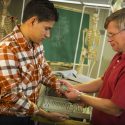New international courses attract wide range of students
Several new international studies courses will be offered at UW–Madison in spring 2006, reflecting new faculty scholarship at the university as well as increased student interest in a wide range of international studies courses.
Among the new offerings:
- Introduction to the Middle East (Language and Cultures of Asia 300);
- Topics in Global Security: Introduction to Global Studies (International Studies 601);
- The Politics of Green Voters and Consumers (European Studies 804);
- Health, Illness and Healing in Contemporary Africa (Anthropology 901);
- The Vampire in Literature and Film (Literature in Translation 248).
“The new courses reflect both the amazing breadth and depth of our international studies course offerings,” says Aili Tripp, associate dean of International Studies and a professor of political science and women’s studies. “They are evidence of how hard our faculty work to develop new courses to ensure that students are aware of emerging global trends. The courses are certain to be enormously popular.”
Introduction to the Middle East, taught by Professor Uli Schamiloglu, languages and cultures of Asia, will be a required core course for the new certificate in Middle East Studies (approval anticipated in 2006). It is open to anyone interested in learning more about this fascinating and important region.
Topics in Global Security: Introduction to Global Studies, taught by communication arts professor Michael Curtin, will examine globalization as a central phenomenon of the contemporary era.
The Politics of Green Voters and Consumers, a broadly interdisciplinary graduate seminar taught by Elizabeth Covington, European studies, will focus on comparative transatlantic environmentalism and consumerism. The course is being planned in consultation with the Wisconsin Department of Natural Resources and the Bavarian Ministry for the Environment and Consumer protection with a view to participation in a long-term transatlantic working group on environmental regulatory reform.
Health, Illness and Healing, taught by anthropology professor and medical doctor Claire Wendland, will examine current major health issues in Africa from an interdisciplinary perspective, focusing on contemporary Africa as well as issues in international politics.
The Vampire in Literature, taught by Professor Toma Longinovic (Slavic Languages), explores the figure of the vampire as an evolving cultural artifact, serving both as a means of self-identification by various Slavic and East European nations, as well as a lens for the rest of the world for viewing the region.
Tags: diversity, international, learning

